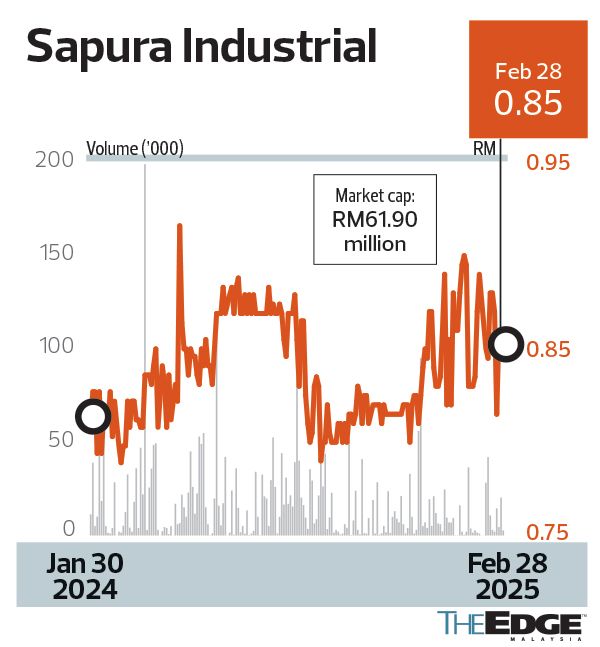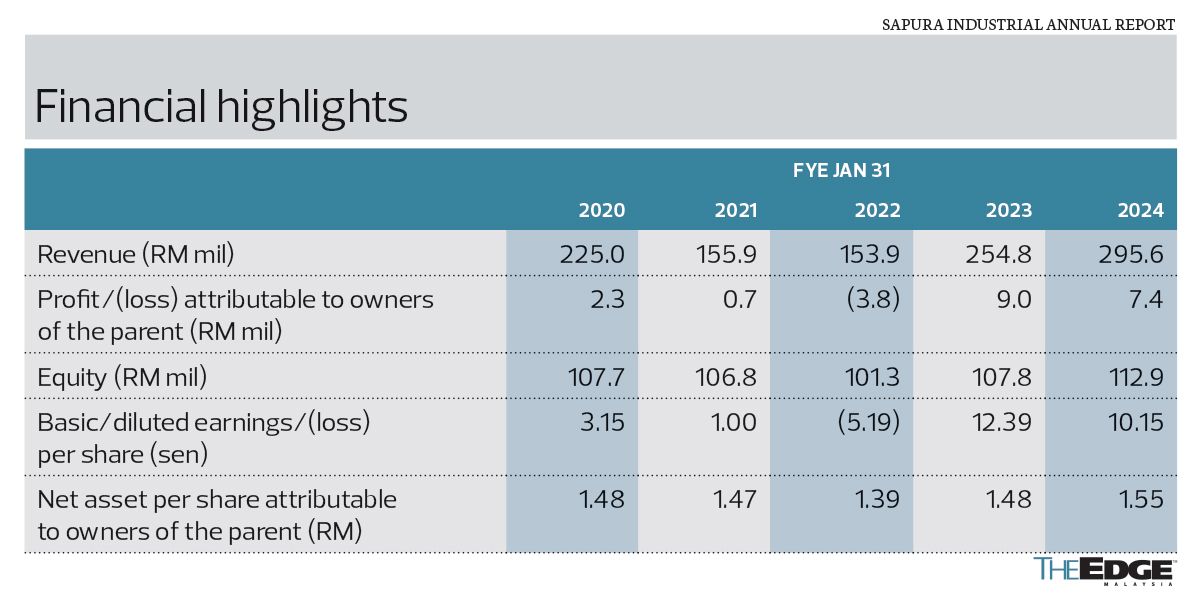
This article first appeared in The Edge Malaysia Weekly on March 3, 2025 - March 9, 2025
LOW-key auto parts manufacturer Sapura Industrial Bhd (KL:SAPIND) is looking to diversify its earnings base and move into higher-margin products, which may involve manufacturing components for devices in the healthcare industry as well.
The company’s internal plan is for a revenue breakdown of 60% from the auto-related businesses and the remaining 40% to come from other sources within five years.
To kick-start the higher margins and revenue diversification initiative, Sapura Industrial is looking at a capital expenditure (capex) of about RM25 million to acquire higher-grade precision tooling equipment.
“We’re talking about specifically [moving] into advanced manufacturing businesses which have a technology edge ... we’re talking about the IoT of the world, you know the Internet of Things. And then we’re talking about precision machining processes … As we all know, automotive component manufacturers’ margins are very competitive. So what we’re trying to do is ... move up the value chain, as a higher value-added provider to the customer. This will enhance the margins [of Sapura Industrial] a lot further … So the whole idea is to move into a higher-margin business,” Sapura Industrial managing director (MD) Datuk Syed Izuan Syed Kamarulbahrin tells The Edge in an exclusive interview.
“As far as the business is concerned, it is still what you call machining. It’s still a precision machining business, but the precision has changed from 1mm — you know from we’re talking about 1mm, 50 microns, 60 microns, to now we’re talking about 10 microns, 20 microns sort of precision. So the core competencies remain the same, but we have moved up in terms of the requirement for the competencies. So there is a lot more value added now for the clients.”
He does not discount any mergers and acquisitions (M&A) down the road for Sapura Industrial and admits to having engaged a few parties for such activities. “There is only so much that we can grow, organically. So on M&A activities, this is where [if] we can’t grow internally, then we will have to look at how best to acquire [businesses].”
Syed Izuan was appointed MD of the company in early January, after 3½ years as an independent non-executive director. He started his career with accounting firm PwC in 1993, after which he joined the business development and corporate affairs department of conglomerate Malaysian Resources Corp Bhd (KL:MRCB), and then moved on to the diversified Sapura group, which has interests in oil and gas, commercial properties and aviation among others. He initially joined Sapura group as an investment manager and was later bumped up to chief financial officer (CFO).
Subsequent to the Sapura group, Syed Izuan was also CFO of Tan Sri Syed Mokhtar Albukhary’s Tradewinds Plantation Bhd and Tradewinds (M) Bhd, and also had a stint with businessman Tan Sri Syed Azman’s Weststar group, which is primarily involved in the automotive and aviation sectors, among others.
Syed Izuan explains Sapura Industrial’s strategy. “[The auto parts business] is a volume business. But in this instance [with the diversification], it’s not hinged on volume, but it’s a high-margin [business] — lower volume but high-margin type of business.”
The move into higher-margin products should augur well for Sapura Industrial, which currently undertakes high-precision machining of engine, transmission and brake components; the manufacture of stabiliser bars and assembly of modular chassis components for the automotive industry; as well as producing cold drawn high-grade structured steel bars used in the automotive, electrical and electronics industries, among others.
“In healthcare alone, we’re talking about robotics being in place for surgeons to conduct precision surgery. And the mechanicals that would be required for those procedures are the items that would use this kind of precision that would be required … We’re talking about surgery. Surgery cuts across a multitude of healthcare lines, from the heart to the liver to parts of the brain where it requires a lot more precision, and that precision requires a different type of technology, where robots will be used on a more frequent basis,” says Syed Izuan.
For the nine months ended Oct 31, 2024 (9MFY2025), Sapura Industrial chalked up a net profit of RM4.97 million on the back of RM213.64 million in revenue. In the previous corresponding period, the company made a net profit of RM4.83 million from RM218.13 million in turnover.
Similar to its financial year ended Jan 31, 2024 (FY2024), its net profit margin for the first nine months of FY2025 was about 2.5%. Its net profit margin in FY2023 came to 3.5% but it was bolstered by the sale of an asset — a cold drawn bar line — and a write-back of debtors and inventories as a result of the settlement of overdue debts and inventories by an export customer.
At end-FY2024, Sapura Industrial had cash and bank balances of RM13.71 million and short-term investments of RM19.51 million. On the other side of the balance sheet, it had long- and short-term borrowings of RM26.29 million and RM13.6 million respectively.
The company had retained profits of RM37.88 million at end-October last year.
On how Sapura Industrial plans to raise the RM25 million capex requirement, Syed Izuan says, “Well, the banks are more than ready to support us. I think it’s just prudent for us to leverage a little in order to ensure that we achieve the maximum optimal return.”
The company’s finance costs were a manageable RM1.99 million in 9MFY2025.
On its prospects, Sapura Industrial says in its latest financial statement, “The Malaysian Automotive Association has revised its forecast total industry volume (TIV) for 2024 from 740,000 to 765,000 vehicles after taking into account the resilient domestic economy, ongoing new model launches and a healthy backlog of orders. The revised TIV represents a 4.3% decrease from 2023’s record-breaking achievement of 799,731 units. The group expects volume to remain consistent throughout the year and will continue to focus on operational efficiencies, improving productivity and optimising its resources to meet customer demand.”
It is also worth noting that Sapura Industrial has a small share base of only 72.77 million shares. Its largest shareholders are Tan Sri Shamsuddin Abdul Kadir, founder of the Sapura group of companies who has an indirect shareholding of 28% and an additional 18.96% held via The Ameis Trust, and Koh Kok Hooi with 11.05% equity interest.
Syed Izuan, in his chat with The Edge, says the move into higher-margin-generating businesses does not mean Sapura Industrial will ignore its existing business but will strengthen it further as well.
“There is an existing client base that we have now. So, what we’re trying to do is to offer them a higher degree of value add rather than what we were doing in the past. So we will continue to do the past [businesses and] we will continue to strengthen that relationship, but we will move up the value chain in terms of [the customers’] involvement with [the businesses],” he says.
While 66% of Sapura Industrial’s revenue stems from contracts with Perusahaan Otomobil Kedua Sdn Bhd (Perodua), the company has added on a number of customers, notably Great Wall and Chery, both from China. Other than Perodua, Proton Holdings Bhd accounted for 11% of Sapura Industrial’s revenue in FY2024, while Stellantis, which has the Peugeot brand among others, accounted for 8% of the company’s revenue in FY2024.
“[In] three years’ time, with all these things falling into place, we hope to be able to diversify our revenue in terms of the dependence on automotive, which is heavily now on Perodua, to a more diversified clientele. But also moving away from just automotive component manufacturing to include healthcare, the advanced industrial technologies, which include IoT, and also ultimately into the aeronautical lines as well,” says Syed Izuan.
Sapura Industrial’s shares ended trading at 85 sen apiece last Friday, which translated into a market capitalisation of RM61.9 million.
Save by subscribing to us for your print and/or digital copy.
P/S: The Edge is also available on Apple's App Store and Android's Google Play.
- Fire incident in Putra Heights not related to Gas Malaysia facilities, company says
- Massive gas pipeline fire in Puchong — Fire Dept
- Petronas confirms fire incident at Petronas Gas main pipeline near Puchong
- Gas pipeline blaze: 25 receiving initial medical treatment as of 10.35am
- Gas pipeline blaze: Fire Dept evacuating nearby residents
- Stocks stabilise, gold hits record before Trump tariff reveal
- Australia's central bank holds rates as it frets over trade war risk
- Brokers Digest: Local Equities - Greatech Technology Bhd, Alliance Bank Malaysia Bhd, Kuala Lumpur Kepong Bhd, Malaysian Resources Corp Bhd
- Insider Moves: Kanger International Bhd, HHRG Bhd, EG Industries Bhd, T7 Global Bhd, Sin Heng Chan (Malaya) Bhd
- Sale of KFC back on the menu?


